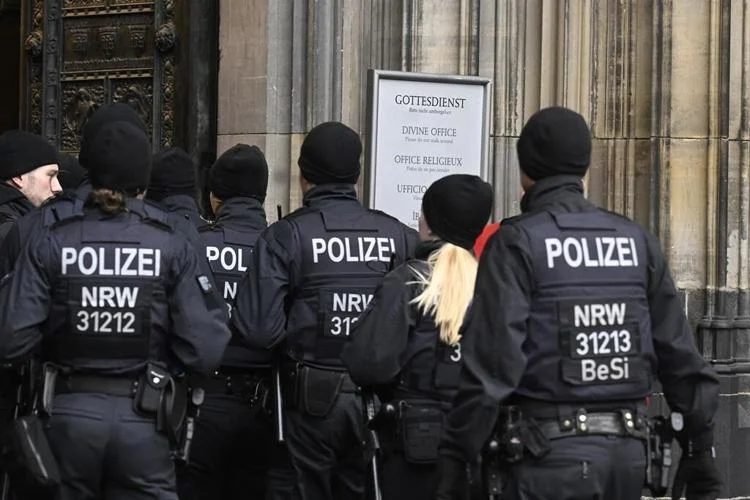
FRANKFURT, Germany — Christians around the world were striving on Christmas Eve to put aside the worries and fears of an unsettled, war-torn world as they prepared to celebrate the birth of Jesus of Nazareth.
Before leading Sunday Mass at St. Patrick’s Cathedral in New York City, Cardinal Timothy Dolan reminded congregants to keep war-torn parts of the Middle East in their Christmas prayers.
“As we anticipate Christmas, our hearts always go to the holy land,” he said, referring to parts of Israel and the Palestinian territories. “The holy land is under a cloud, the holy land is suffering, the holy land is filled with violence and hatred and retribution. And this dulls and threatens to suffocate the joy of Christmas.”
Believers in Syria gathered in a country still suffering from the aftermath of a long civil war and suffocating economic blockade. Despite festive lights and Christmas decorations adorning houses and shopfronts in the capital Damascus, events in Gaza and ongoing battles in parts of the country have left the holiday atmosphere subdued.
Sightseeing-only visits were barred at Germany’s landmark cathedral in Cologne and Christmas Eve worshippers faced security checks to get into midnight Mass there Sunday as police responded to indications of a potential attack. Still, officials urged people not to shy away from holiday celebrations out of fear.
Auxiliary Bishop Rolf Steinhaeuser greeted people attending services with a relaxed smile and an expression of thanks for police security efforts, a day after police descended on the cathedral and searched it with sniffer dogs. With several dozen officers on duty outside, he said it was “probably the most secure church service in all of Germany.”
In Austria, police said they also were stepping up security around Vienna’s churches and Christmas markets, apparently responding to the same intelligence about a potential threat. They did not give further information, but the dpa news agency reported without citing a source that the threat was from an Islamic extremist group.
Cologne’s towering cathedral, whose twin spires rise 157 meters (515 feet) high, is a major tourist destination visited by some 6 million people a year. It is home to the Shrine of the Three Kings, a gold- and silver-decorated casket said to contain the relics of the wise men described in the New Testament as paying homage to the newborn Jesus.
The European Union’s home affairs commissioner, Ylva Johansson, warned Dec. 5 that Europe faces a “huge risk of terrorist attacks” over the Christmas holidays due to fallout from the war between Israel and the Palestinian militant group Hamas. Johansson provided no details about any police or security information that might have led to her warning.
Ukraine is preparing to officially mark Christmas as a state holiday on Dec. 25 for the first time after moving the date in line with countries in Western Europe. President Volodymyr Zelenskyy signed legislation in July moving the holiday to Dec. 25 from Jan. 7, when it is observed by the Russian Orthodox Church and also by one of Ukraine’s two competing Orthodox churches. Some Eastern Orthodox churches continue to use the ancient Julian calendar, under which Christmas falls 13 days later.
A note attached to the law said its goal was to “abandon Russian heritage” and cited “the desire of all Ukrainians to live their lives with their own traditions, holidays.”
“The nights before Christmas are the longest of the year. However, the day has already begun to lengthen and the light has begun to prevail. The light grows stronger. Darkness will eventually lose. Evil will be defeated,” Zelenskyy said in a video address Sunday.
In Pakistan’s eastern Punjab province, Christians whose homes were destroyed or damaged by a Muslim mob in August celebrated against a background of fear in the city of Jaranwala. Christians fled their homes to escape the attackers, returning to scenes of destruction.
Jaranwala resident Ratan Bhatti said Christmas won’t be like it used to be. “Every house used to be illuminated, decorated with stars,” he said. “People are still in fear and grief. Our biggest church was burnt. It is difficult to forget that day.”
The rampage was one of the most destructive attacks on Christians in Pakistan’s history and drew nationwide condemnation. The minority, who are among Pakistan’s poorest, face an increasingly intolerant atmosphere in the Muslim-majority nation where radical religious and sectarian groups have become more prominent.
Local priest Khalid Mukhtar said people in Jaranwala had yet to emerge from their trauma. “We are yet to see the traditional spirit of Christmas. We are trying to motivate people to celebrate the festival with traditional fervor.”



